IBMS-iPSC-014-05
IBMSi003-A
General
Cell Line |
|
| hPSCreg name | IBMSi003-A |
| Cite as: | IBMSi003-A (RRID:CVCL_QY07) |
| Alternative name(s) |
IBMS-iPSC-014-05
|
| Cell line type | Human induced pluripotent stem cell (hiPSC) |
| Similar lines |
ZJSHi001-A (ZJSHi-KCNB1) Donor's gene variants: KCNB1 Donor diseases: developmental and epileptic encephalopathy, 26 PFIZi023-A (B217c8) Donor's gene variants: GPR56, GPR56 Donor diseases: Bilateral Frontoparietal Polymicrogyria |
| Last update | 22nd May 2019 |
| User feedback | |
Provider |
|
| Generator | Institute of Biomedical Sciences, Academia Sinica (IBMS) |
External Databases |
|
| BioSamples | SAMEA104387752 |
| Cellosaurus | CVCL_QY07 |
| Wikidata | Q54897192 |
General Information |
|
| Publications | |
| * Is the cell line readily obtainable for third parties? |
Yes Research use: allowed
Clinical use: not allowed
Commercial use: not allowed
|
| Subclones | |
Donor Information
General Donor Information |
|
| Sex | female |
| Age of donor (at collection) | 60-64 |
| Ethnicity | East Asian (Taiwanese) |
Phenotype and Disease related information (Donor) |
|
| Diseases | A disease was diagnosed.
|
External Databases (Donor) |
|
| BioSamples | SAMEA104387753 |
Ethics
| Has informed consent been obtained from the donor of the embryo/tissue from which the pluripotent stem cells have been derived? | Yes |
| Was the consent voluntarily given? | Yes |
| Has the donor been informed that participation will not directly influence their personal treatment? | Yes |
| Can you provide us with a copy of the Donor Information Sheet provided to the donor? | No |
| Do you (Depositor/Provider) hold the original Donor Consent Form? | No |
| If you do not hold the Donor Consent Form, do you know who does? | Yes |
| Alternatives to consent | |
| Alternative consent approval number | |
| Please indicate whether the data associated with the donated material has been pseudonymised or anonymised. | anonymised |
| Does consent explicitly allow the derivation of pluripotent stem cells? | Yes |
| * Does consent expressly prevent the derivation of pluripotent stem cells? | No |
| Details on restriction to research project | |
| Does consent prevent CELLS DERIVED FROM THE DONATED BIOSAMPLE from being made available to researchers anywhere in the world? | Yes |
| How may genetic information associated with the cell line be accessed? | No information |
| Will the donor expect to receive financial benefit, beyond reasonable expenses, in return for donating the biosample? | No |
| Please describe how access is provided: | |
| Contact data, institution, or website: | |
| Has a favourable opinion been obtained from a research ethics committee, or other ethics review panel, in relation to the Research Protocol including the consent provisions? | Yes |
| Name of accrediting authority involved? | Institution Review Board on biomedical science research at Academia Sinica Taiwan and Kaohsiung Medical University Hospital |
| Approval number | (AS-IRB-BM-15019) (KMUHIRB-20140116) |
| Has a favourable opinion been obtained from a research ethics committee, or other ethics review panel, in relation to the PROPOSED PROJECT, involving use of donated embryo/tissue or derived cells? | No |
| Name of accrediting authority involved? | |
| Approval number | |
| Please describe: | |
| Further constraints on use | |
| For generation of the cell line, who was the supplier of any recombined DNA vectors or commercial kits used? | |
| Constraints for use or distribution |
hIPSC Derivation
General |
|
| Source cell type |
A leukocyte with a single non-segmented nucleus in the mature form found in the circulatory pool of blood.
|
| Age of donor (at collection) | 60-64 |
Reprogramming method |
|
| Vector type | Non-integrating |
| Vector | Sendai virus |
| Is reprogramming vector detectable? |
No |
| Methods used |
PCR
|
| Files and images showing reprogramming vector expressed or silenced | |
Vector free reprogramming |
|
Other |
|
| Selection criteria for clones | Tra-1-60 positive, ES-like morphology |
| Derived under xeno-free conditions |
Unknown |
| Derived under GMP? |
Unknown |
| Available as clinical grade? |
Unknown |
Culture Conditions
| Medium |
Other medium:
Base medium: DMEM/F12
Main protein source: Knock-out serum replacement Serum concentration: 20 % Supplements
|
|||||||||||||||
| Has Rock inhibitor (Y27632) been used at passage previously with this cell line? | Yes |
|||||||||||||||
| Has Rock inhibitor (Y27632) been used at cryo previously with this cell line? | No |
|||||||||||||||
| Has Rock inhibitor (Y27632) been used at thaw previously with this cell line? | Yes |
Characterisation
Analysis of Undifferentiated Cells
| Marker | Expressed | Immunostaining | RT-PCR | Flow Cytometry | Enzymatic Assay | Expression Profiles |
| POU5F1 (OCT-4) |
Yes |
Score:
| Marker | Present | Absent |
| mCpG | ||
| OCT4 |
Differentiation Potency
Glandular structure
In vivo teratoma
Neural tissue
In vivo teratoma
Genotyping
Karyotyping (Cell Line) |
|
| Has the cell line karyotype been analysed? |
Yes
|
Other Genotyping (Cell Line) |
|


Login to share your feedback, experiences or results with the research community.